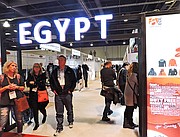TRADE SHOWS
Sourcing at MAGIC Celebrates Chinese New York With a Dragon Parade on the Show Floor
Sourcing at MAGIC has always been like a mini version of the United Nations. Countries from all over the world exhibit a wide-ranging collection of clothing, shoes, accessories, textiles and machinery.
This year was no different. There was a handbag exhibitor from Myanmar, blue-jeans manufacturers from Mexico, apparel factories from Egypt, shoe factories from China and a Made-in-the-USA section where Los Angeles software company Tukatech displayed a high-tech micro factory using laser-cutting machines and other cost- and work-saving devices to manufacture clothes more efficiently.
Instead of being held in the North Hall of the Las Vegas Convention Center, as in previous years, the Feb. 4–7 show was held in the South Hall.
Because this year’s show took place one week earlier than in previous years, it coincided with Chinese New Year, which began on Feb. 5.
That meant scores of Chinese companies did not attend this season’s trade show. However, about 600 exhibitors out of 1,100 booths were from China. To keep everyone in a festive Chinese mood, there was a Tuesday-evening party from 5 p.m. to 6 p.m. on the show floor that kicked off with a dragon parade and drums.
There were plenty of first-time exhibitors at the show making a grab for new business. One of those was Pavlina, a handbag manufacturer from Myanmar that was trying to sway U.S. buyers into purchasing the handbags, which enter the United States duty-free. Right now, almost all of the company’s business is with European stores. “We’ve already had a few interested buyers,” said Amit Goyal, the owner of Pavlina, whose stylish bags are made of polyurethane. “We took a look around the show last August to get an idea of what was here and found that the volume of buyers here could be interesting.”
Another new vendor was LA Fashion Trading Ltd., which makes blue jeans in Guangzhou, China. “We decided we had to try the show because our business is going down and we are trying to get new customers,” said David Ghacham, a salesperson with the trading company, which designs its own jeans. He noted that several Chinese factories were being hard hit with the tariff threats by the Trump administration.
Colorful clothes dominated the pavilion from India, where about 70 apparel companies came with the support of the country’s Apparel Export Promotion Council. “We get a lot of introductions at the show,” said A. Sakthivel, the council’s vice chairman.
Permeshwar Exports, started in Mumbai, India, in 1964, has been at the show eight to 10 times now and always gets good feedback, said the company’s founder and director, Basudev Sadh. Many buyers are attracted by the booth’s bright-white cotton scarves and tunics trimmed in vibrant colors, which wholesale for $4.
“It is a good market for us,” Sadh said. “People like very much our selection. If someone appreciates what we make, I like that they come here.”






















